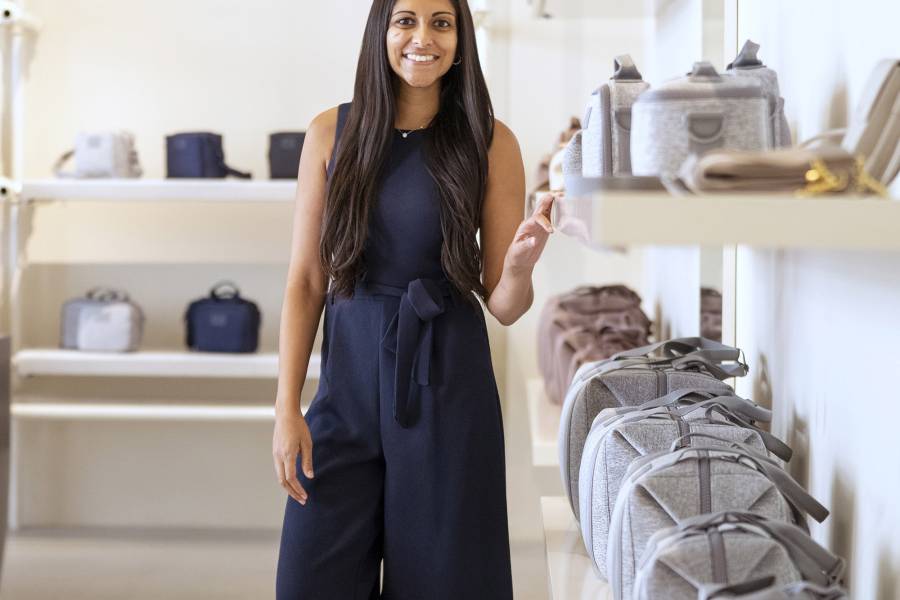Deepa Gandhi, A&S '07, started her career as an equity sales trader at Lehman Brothers. But she quickly realized that the finance path wasn't for her and decided to make an unconventional leap into retail. In 2013, she co-founded and became the COO of Dagne Dover, a mission-focused handbag company that "makes bags for humans getting the most out of life." Since then, Dagne Dover has doubled its revenue nearly every year, and they're one of the fastest growing brands for Nordstrom. Celebrity fans range from Yara Shahidi to Jessica Biel and, inspired by COVID-19, they've recently added a philanthropy component to their business model.
View this post on Instagram
Where did the idea for Dagne Dover come from?
After a few years working as a merchandise planner at Club Monaco, I decided to go back to the Wharton School for an MBA because I was interested in entrepreneurship. At the time, I had a friend who wanted to innovate and revolutionize the handbag industry. We thought, Why can't we make a product designed by women, for women, focused on fashion, function, and smart design, and all at a more attainable price point?
We teamed up with a young, enthusiastic designer and got to work.
What was it like to transition from finance to retail?
It was very different. First, the dress code was a change. I could bring more of myself and my personality into the workplace, so I felt more confident and comfortable. Fashion was an environment that I could thrive in. When I got to Club Monaco, I found that I could really leverage my financial acumen and analysis skills. I think having a different perspective set the groundwork for my entrepreneurship and leadership now.
At Dagne Dover, I love that I'm able to leverage data to understand the consumer psyche and bring other people's ideas to market. I'm not a designer—you don't want me designing your products!—but I am a great partner to creatives and designers. I get to bring both my left and right brain into my work every day.
Tell me about launching Dagne Dover.
Launching a new idea is an intense roller coaster. It's overwhelming, so it helps to be surrounded by good people. At first, we were bringing products to market and also trying to get a supply chain up and running overseas. When we saw initial success and proof of concept, we knew shifting production overseas would help us increase capacity and drive better margins. But this meant we were everywhere—in New York, in Asia—all while I was finishing my MBA. It felt like trying to launch multiple businesses at once!
Your perspective on business growth is unique. Why did you choose that path for Dagne Dover?
Our thesis is that brand building is a long process. You need to find the right team members and the right investors, ideally those who have patient capital. We're always asking, what's the right decision for the brand 10 years from now, not just to drive exponential growth in six months? We find ourselves saying no a lot, if the opportunity isn't right for our long-term growth.
What advice would you give yourself in 2013, when you were launching your company?
The biggest thing is that grit and resilience are extremely important. And that means not just having the energy to push through and get to the next step but being able to stay energized to make better decisions in the future. You don't need to rush toward a specific date. Instead, stay aligned with your partners and investors on your ultimate goal.
What have you learned that's helped to keep Dagne Dover afloat during the pandemic?
We quickly pivoted our voice, our marketing campaigns, and our product road maps. The way people live has fundamentally shifted, and we sell products for people on the go—but people are not going anywhere! However, they still find things they can use from our brand, like fanny packs instead of work totes. COVID enforced the idea that we should have a complex and diverse strategy, and it gave a second life to some of our products.
We also know that our customers come to us not just for our products but because our values are aligned with theirs. We focus on equity and launched a coalition called Brands x Better to support those being impacted by COVID through each purchase made. We try to amplify the voices of diverse creators, and we support quality causes with donations. I think we've really found our voice, and I'm proud we've built a brand that stands for something.
Tagged entrepreneurs, deepa gandhi, dagne dover








